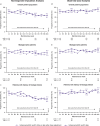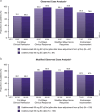Guarantor of the article: Waqqas Afif, MD.
Specific author contributions: W.A., R.P.A., M.T.A., S.D., W.J.S., R.P., T.H., E.J.S., R.W.L., D.S.R., L.P.-B., and B.E.S. participated in the conception and design of the study, analysis and interpretation of the data, and drafted/revised the manuscript for important intellectual content. Y.M., H.Z., and C.M. participated in the conception and design of the study, participated in acquisition/collection of data, analysis and interpretation of data, and drafted/revised the manuscript for important intellectual content. All authors approved the final version of the manuscript for submission.
Financial support: This work was supported by Janssen Research & Development, LLC.
Potential competing interests: W.A. reports having received speaker, advisory board member, and or clinical investigator for AbbVie, Amgen, BMS, Dynacare, Eli-Lilly, Janssen, Merck, Novartis, Pfizer, Prometheus, Sandoz, Sanofi, Takeda, and Theradiag. R.P.A. reports having received grant support and consulting fees from AbbVie, Dr Falk Pharma, and Janssen Research & Development, LLC. M.T.A. reports having received consulting fees from AbbVie, Janssen Research & Development, LLC., Prometheus Biosciences, Takeda, Focus Medical Communications, Pfizer, Boehringer Ingelheim Pharmaceuticals, Gilead, Imedex, Cornerstone Health, Inc., UCB Biopharma SRL, Eli Lilly, Bristol Myers Squibb, and Celsius. S.D. reports having received consultancy fees from AbbVie, Alimentiv, Allergan, Amgen, AstraZeneca, Athos Therapeutics, Biogen, Boehringer Ingelheim, Celgene, Celltrion, Eli Lilly, Enthera, Ferring Pharmaceuticals Inc., Gilead, Hospira, Inotrem, Janssen, Johnson & Johnson, MSD, Mundipharma, Mylan, Pfizer, Roche, Sandoz, Sublimity Therapeutics, Takeda, TiGenix, UCB Inc. and Vifor; and received lecture fees from AbbVie, Amgen, Ferring Pharmaceuticals Inc., Gilead, Janssen, Mylan, Pfizer, and Takeda. W.J.S. reports having received research grants from AbbVie, Abivax, Arena Pharmaceuticals, Boehringer Ingelheim, Celgene, Genentech, Gilead Sciences, Glaxo Smith Kline, Janssen, Eli Lilly, Pfizer, Prometheus Laboratories, Seres Therapeutics, Shire Pharmaceuticals, Takeda, Theravance Biopharma; consulting fees from AbbVie, Abivax, Admirx, Alfasigma, Alimentiv, Alivio Therapeutics, Allakos, Amgen, Arena Pharmaceuticals, AstraZeneca, Atlantic Pharmaceuticals, Bausch Health (Salix), Beigene, Bellatrix Pharmaceuticals, Biora (Progenity), Boehringer Ingelheim, Boston Pharmaceuticals, Bristol Meyers Squibb, Celgene, Celltrion, Clostrabio, Codexis, Equillium, Forbion, Galapagos, Genentech, Gilead Sciences, GlaxoSmithKline, Gossamer Bio, Immunic (Vital Therapies), Index Pharmaceuticals, Inotrem, Intact Therapeutics, Iota Biosciences, Janssen, Kiniksa Pharmaceuticals, Kyverna Therapeutics, Landos Biopharma, Eli Lilly, Morphic Therapeutics, Novartis, Ono Pharmaceuticals, Oppilan Pharma (now Ventyx Biosciences), Otsuka, Pandion Therapeutics, Pfizer, Pharm Olam, Polpharm, Prometheus Biosciences, Protagonist Therapeutics, PTM Therapeutics, Quell Therapeutics, Reistone Biopharma, Seres Therapeutics, Shanghai Pharma Biotherapeutics, Shoreline Biosciences, Sublimity Therapeutics, Surrozen, Takeda, Theravance Biopharma, Thetis Pharmaceuticals, Tillotts Pharma, Vedanta Biosciences, Ventyx Biosciences, Vimalan Biosciences, Vivelix Pharmaceuticals, Vividion Therapeutics, Vivreon Gastrosciences, Xencor, Zealand Pharma; stock or stock options from Allakos, BeiGene, Biora (Progenity), Gossamer Bio, Oppilan Pharma (now Ventyx Biosciences), Prometheus Biosciences, Prometheus Laboratories, Protagnoists Therapeutics, Shoreline Biosciences, Ventyx Biosciences, Vimalan Biosciences, Vivreon Gastrosciences; and employee at Shoreline Biosciences and Ventyx Biosciences. Spouse: Iveric Bio–consultant, stock options; Progenity–stock; Oppilan Pharma (now Ventyx Biosciences)–stock; Prometheus Biosciences–employee, stock, stock options; Prometheus Laboratories–stock, stock options, consultant, Ventyx Biosciences–stock, stock options; Vimalan Biosciences–stock. R.P. reports having received consulting fees from Abbott, AbbVie, Abbivax, Alimentiv (formerly Robarts), Amgen, Arena Pharmaceuticals, AstraZeneca, Biogen, Boehringer Ingelheim, Bristol-Myers Squibb, Celgene, Celltrion, Cosmos Pharmaceuticals, Eisai, Elan, Eli Lilly, Ferring, Galapagos, Fresenius Kabi, Genentech, Gilead Sciences, Glaxo-Smith Kline, JAMP Bio, Janssen, Merck, Mylan, Novartis, Oppilan Pharma, Organon, Pandion Pharma, Pendopharm, Pfizer, Progenity, Prometheus Biosciences, Protagonist Therapeutics, Roche, Sandoz, Satisfai Health, Shire, Sublimity Therapeutics, Takeda Pharmaceuticals, Theravance Biopharma, Trellus, Viatris, Ventyx, UCB; Speaker's Fees from AbbVie, Amgen, Arena Pharmaceuticals, Bristol Myers Squibb, Celgene, Eli Lilly, Ferring, Fresenius Kabi, Gilead Sciences, Janssen, Merck, Organon, Pfizer, Roche, Sandoz, Shire, Takeda Pharmaceuticals and served on Advisory Boards for: AbbVie, Alimentiv (formerly Robarts), Amgen, Arena Pharmaceuticals, AstraZeneca, Biogen, Boehringer Ingelheim, Bristol-Myers Squibb, Celgene, Eli Lilly, Ferring, Fresenius Kabi, Genentech, Gilead Sciences, Glaxo-Smith Kline, JAMP Bio, Janssen, Merck, Mylan, Novartis, Oppilan Pharma, Organon, Pandion Pharma, Pfizer, Progenity, Protagonist Therapeutics, Roche, Sandoz, Shire, Sublimity Therapeutics, Takeda Pharmaceuticals, and Ventyx. T.H. reports having received grant support from AbbVie, Daiichi-Sankyo, EA Pharma Co, Ltd. JIMRO, Mitsubishi Tanabe Pharma Corporation, Mochida Pharmaceutical Co., Ltd., Nippon Kayaku Co., Ltd., Pfizer Inc., and Takeda Pharmaceutical Co., Ltd.; received consulting fees from EA Pharma Co, Ltd. and Janssen Research & Development, LLC.; and received lecture fees from AbbVie, EA Pharma Co, Ltd., Mitsubishi Tanabe Pharma Corporation, Eli Lilly, Gilead Sciences, Kissei Pharmaceutical Co, Ltd., and Takeda Pharmaceutical Co., Ltd. E.J.S. reports having received grant support from AbbVie, AstraZeneca, Crohn's and Colitis Foundation, Janssen Research & Development, LLC., New York Crohn's Foundation, Pfizer, UCB, Genentech, Seres Therapeutics, and Celgene; received consulting fees from AbbVie, Abgenomics, Crohn's and Colitis Foundation, Evidera, GI Health Foundation, Janssen, Protagonist, Seres, and Takeda Stock: Gilead; and received speaker fees from GI Health Foundation and Prime Therapeutics. R.W.L. reports having received advisory board fees from AbbVie, Aspen, BMS, Celgene, Celltrion, Chiesi, Ferring, Glutagen, Hospira, Janssen, Lilly, MSD, Novartis, Pfizer, Prometheus Biosciences, and Takeda; received research grants from Celltrion, Shire, Janssen, Takeda, Joanna Tiddy grant from University of Sydney, McCusker Charitable Trust, Gastroenterological Society of Australia, NHMRC, Gutsy Group, and Pfizer. D.S.R. reports having received speaker fees from AbbVie, Janssen Research & Development, LLC., and Emerge Health and served as an advisory board member for AbbVie and Janssen Research & Development, LLC. L.P.-B. reports having received personal fees from AbbVie, Allergan, Alma, Amgen, Applied Molecular Transport, Arena Pharmaceuticals, Biogen, Boehringer Ingelheim, Bristol Myers Squibb, Celgene, Celltrion, Eli Lilly, Enterome, Enthera, Ferring, Fresenius, Genentech, Gilead, Hikma, Index Pharmaceuticals, Janssen, MSD, Mylan, Nestlé, Norgine, Oppilan Pharma, OSE Immunotherapeutics, Pfizer, Pharmacosmos, Roche, Samsung Bioepis, Sandoz, Sterna, Sublimity Therapeutics, Takeda, Tillots, and Vifor; received grants from AbbVie, MSD, and Takeda; and received stock options from CTMA. Y.M., H.Z., and C.M. all are employees of Janssen Research & Development, LLC and own stock/stock options in Johnson & Johnson. B.E.S. reports consulting fees from AbbVie, Alimentiv, Amgen, Arena Pharmaceuticals, Artugen Therapeutics, Astra Zeneca, Boehringer Ingelheim, Boston Pharmaceuticals, Calibr, Celgene, Celltrion, ClostraBio, Equillium, Enthera, Evommune, Fresenius Kabi, Galapagos, Genentech (Roche), Gilead Sciences, GlaxoSmithKline, Gossamer Bio, Index Pharmaceuticals, Innovation Pharmaceuticals, Inotrem, Kaleido, Kallyope, Merck, Morphic Therapeutics, MRM Health, Progenity, Prometheus Biosciences, Prometheus Laboratories, Protagonist Therapeutics, Q32 Bio, Sun Pharma, Surrozen, Target RWE, Teva, TLL Pharmaceutical, and Ventyx Biosciences; consulting and speaking fees from Abivax; consulting and speaking fees and other support from Eli Lilly; research grants, consulting and speaking fees and other support from Bristol Myers Squibb, Janssen, Pfizer, and Takeda; research grants and consulting fees from Theravance Biopharma; and stock options from Ventyx Biopharma.
Writing assistance: Medical writing support was provided by Kristin Ruley Sharples, PhD, of Janssen Scientific Affairs, LLC, under the direction of the authors in accordance with Good Publication Practice guidelines (Ann Inter Med. 2015;163:461-464) and was funded by Janssen Scientific Affairs, LLC.
Data transparency statement: The data sharing policy of Janssen Pharmaceutical Companies of Johnson & Johnson is available at https://www.janssen.com/clinical-trials/transparency. As noted on this site, requests for access to the study data can be submitted through Yale Open Data Access (YODA) Project site at http://yoda.yale.edu.
The authors thank the patients, investigators, and study personnel who made the UNIFI LTE possible. All authors had access to the study data and reviewed and approved the final manuscript.






